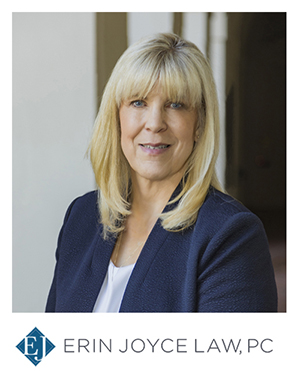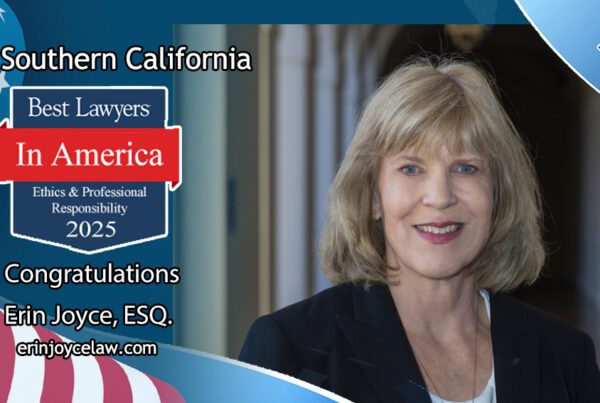How to Keep Your Client’s Money Safe and Your License Safe All At the Same Time!
By Erin Joyce
The complexity of managing California client trust accounts (“CTA”) can overwhelm even the most experienced attorneys and staff. Attorneys have comprehensive and binding ethical, legal and fiduciary obligations to account for all funds and property received or held for the benefit of clients and third parties. On November 1, 2018, Rule 1.15 was adopted by the California Supreme Court. (Rule 1.15 “Safekeeping Funds and Property of Clients and Other Persons”; see also former Rule 4-100). While the new Rule is very specific, it is only the starting point for understanding an attorney’s fiduciary duties and responsibilities.
Over the last decade, the State Bar has tried to obtain authority to conduct random audits of attorney trust accounts in the name of public protection. All prior efforts have been rebuffed. But in the wake of the revelations about the complaints concerning missing funds from the clients of Tom Girardi, which were not properly investigated by the State Bar, now the State Bar sees the opportunity to push for more invasive audits. With the specter of random audits of client trust accounts on the horizon, it is imperative that attorneys are fully compliant with Rule 1.15 to avoid significant discipline.
The basic purposes of California trust accounting are generally well known: Do you know how much money you are holding for clients and what belongs to each individual client? Does your account meet the basic set-up rules? Are you keeping client monies completely and utterly isolated from all of your personal, operating and saving accounts? Are you timely transferring funds when earned, leaving no extraneous funds in trust accounts? Are you keeping a solid, definable audit trail that meets State Bar standards? Meeting these basic requirements and knowing why they exist is at the heart of every attorney’s obligation to their clients.
In California, investigators at the State Bar often examine trust violations more closely than any nearly other type of complaint. For decades, mismanagement and mishandling of funds has remained one of the most frequent causes of discipline. Literally thousands of notifications that trust accounts are overdrawn are received annually by the State Bar. However, by carefully following the procedures outlined by the State Bar, attorneys can avoid accusations of malfeasance, negligence and even moral turpitude. (See e.g., Business and Professions Code Section 6106).
Remember: a fiduciary is responsible to account for every penny. As long as the funds remain in the attorney’s possession, the duty to safeguard the funds is the attorney’s and the attorney’s alone. Failure to live up to this responsibility can result in personal monetary liability, fee disputes, loss of clients, public discipline and even findings of moral turpitude. The stakes are high for not acting within the Rule.
I. SOME BASICS
Rule 1.15(a) contains the basic requirements for CTA compliance: an attorney accepting client monies must create an account that is specifically entitled a “trust account” and then register that account with the State Bar of California. For funds received in California, the account must also be in California unless waived by the client in writing. (Rule 1.15(a)). Also in California, the account must be a fully qualified IOLTA trust account from an approved institution, such that interest on the monies in the account is sequestered and transferred monthly to the State Bar for distribution to approved entities performing legal services for the indigent or underserved. (See e.g., State Bar Client Trust Account FAQ (http://www.calbar.ca.gov/Attorneys/Conduct-Discipline/Client-Trust-Accounting-IOLTA/FAQ)).
It is no defense to trust errors to blame one’s accountant or staff for not following Rule 1.15 obligations — keeping a CTA in order is an attorney’s non-delegable duty. (Matter of Male-Younan (Review Dept. 2003) 4 Cal. State Bar Ct. Rpt. 627, 634-634); Matter of Robins (Review Dept. 1991) 1 Cal. State Bar Ct. Rptr. 708, 712-714). While attorneys may use staff to perform tracking activities, including trained bookkeepers and accountants, the attorney alone is responsible for trust account accuracy.
The concept of a “fiduciary duty” to clients is a broad one. However, Rule 1.15(d) provides a list of some very specific fiduciary duties:
1. Duty to notify client or other person of receipt of funds
2. Duty to identify and label securities and properties of client
3. Duty to maintain completed records of all funds coming into lawyer’s possession
4. Duty to account
5. Duty to preserve records for no less than five years from final distribution
6. Duty to comply with order for audit
7. Duty to promptly distribute funds as requested by client or other person
(Rule 15(d); cf. former Rule 4-100 which has fewer specific duties listed). One duty that is now spread throughout the new Rules is that an attorney’s duty is now more clearly extended to certain “other persons.” (See e.g., Rule 1.15(a)). These “other persons” may include the State Department of Health Services (DHS) with regard to a medical lien. They may include liens for disputed funds between attorneys. These types of funds must remain in the trust account until all disputes are resolved.
Additionally, all advanced fees must go into a client trust account (except flat fees in certain circumstances with informed written consent). (See Rule 1.15(b)). The list of “fiduciary duties” is long but compliance is crucial given the risks to the attorney. These duties are enforced strictly by the State Bar as it considers them central to its stated duty to protect the public.
II. CLIENT MONEY MUST IDENTIFABLE AND KEPT SEPARATE TO AVOID COMMINGLING AND MISAPPROPRIATION
One of the easiest rules to violate when it comes to CTAs is the rule against “commingling.” (Rule 1.5(c); (former Rule 4-100(A)(2); In the Matter of Bleecker (Review Dept. 1990) 1 Cal. State Bar Ct. Rptr. 113). Each client’s monies are in essence distinguished as separate through the use of a “client ledger” for each client in a common client trust account. Each client should have their own “ledger” — if you have 10 clients, you need 10 separate ledgers. The importance of this seems obvious – when money is paid out, you need to make sure that this is the client’s money. Accidentally paying a client $10.50 when you are holding only $10 of their money means that you spent 50 cents of another client’s money. That is all the State Bar needs to show to prove commingling.
Depositing or leaving funds one’s own funds in a CTA can create major problems down the line if the State Bar requests an audit. There are few exceptions to the rule against for keeping non-client funds in a CTA – for example, settlement funds need to be fully “cleared” by one’s bank before distribution. Likewise, small sums of money to cover expected bank fees can be deposited to avoid negative balances from such regular charges. (Cf. State Bar Formal Opinion No. 2005-169 (leaving excess funds in an account to avoid error is not permitted but overdraft protection is not prohibited).
Intentional commingling creates an obvious ethical problem – imagine an attorney keeping earned funds inside a CTA for a lengthy period of time, say from one year to the next. This might be seen as intending to evade taxes or creditor liability. Such actions will put the integrity of the account in jeopardy – the taxing agency or creditor could potentially seize the entire account including client monies. This type of behavior could lead to very serious discipline.
Even some innocent inclusions of smaller amounts of non-client funds could be actionable: accounting efforts may be clouded when an audit trail is being scrutinized. If an attorney is keeping his or her money in the CTA making an error becomes easier and client’s funds are at still risk, innocent mixing or not. Pay attention to what is deposited and when is important to avoid commingling as defined by the Rules.
III. AVOID MISAPPROPRIATION
A. You Can’t Spend What You Don’t Have
Misappropriation is shown when the balance in the CTA dips below the level required to be maintained for any particular client. The State Bar need not show that the attorney benefited or used misdirected funds, only that the attorney failed to maintain in trust the funds belonging to the client or another third party. In the case of competing claims on entrusted funds, if the attorney unilaterally distributes the funds to the attorney’s client, the attorney is culpable of misappropriation.
B. Duties to Third Parties Over Disputed Fees
In today’s hotly contested litigation environment, disputes over attorney fees are becoming more common. Misunderstandings as to where earned but disputed fees are to be kept abound. Disputed fees should be left in an attorney’s trust account until the dispute is settled (State Bar Formal Opinion No. 2008-175; former Rule 4-100(B)(4)). Holding such funds in an “escrow” is not appropriate, but the funds must be withdrawn as soon as the dispute is finalized. (Id.)
IV. TIMING IS KEY
Another key concept is that an attorney cannot remove entrusted funds from the trust account until they have been earned. Even when a client is anxious to receive the client’s portion of the settlement, and even if the bank agrees to provide “instant credit” due to the attorney’s good relationship with the financial institution, the attorney should always wait until the settlement check has cleared before distributing any settlement funds. To issue a check early is another way to put other client funds at risk.
V. ACCURATE BALANCES ARE REQUIRED
Attorneys are required to maintain pristine trust accounting records. This means that the “running balance” in the CTA and the balance in the account for each client whose funds are deposited in the account is 100% accurate. The running balance is the daily balance taking into account all deposits and all withdrawals on behalf of all clients or third parties in the account. Making a mistake in the running balance makes it more likely that errors are being made elsewhere, potentially to a client’s detriment.
Also as entrusted funds are paid out, the attorney needs to maintain a client ledger card to show all disbursements on behalf of the client or third party. The idea is to bring the balance in the account on behalf of each client precisely to zero. Mistakes in client ledger cards are again seen by the State Bar as a red flag that problems exist.
Maintaining these records is also crucial – one must be able at all times to document payments to each client, lien holder and the attorney for each and every settlement.
VI. PERFECT AUDIT TRAILS ARE NECESSARY
Many lawyers are also not aware that the State Bar may conduct a full audit of an entire trust account if it appears that any misappropriation took place in trust accounting (See Business and Professionals Code section 6091). According to Rule 1.15(d)(3), all “Client Trust Account”. In order to perfect the audit trail, attorneys must keep the following records and documentation:
• Client Ledgers
• Account Journals
• Bank Statements and Cancelled Checks
• Reconciliations
Extremely basic sample forms are included in the Handbook that will meet these requirements. However, the State Bar may accept properly formatted reports made through computer accounting programs such as QuickBooks. The State Bar Handbook cautions however that “just having the data stored electronically in the cloud, or a drive (local or external) or saved to storage media is risky.” The Handbook specifically recommends keeping hard copies of reports and statements. (See Handbook, page 20).
Rule 1.15(d) goes even further when it comes to copies of cancelled checks – keeping copies is actually required. (Id.) The Handbook cautions that it may be quite common for a bank to be purchased by another bank or even close, thus cutting off the ability of an attorney to find proof of cashing by the client. Keeping deposit slips and checkbook stubs – which is truly common sense – is also suggested. Compliance with Rule 1.15(d) in essence simply requires that you keep track of how much money you are holding for each client at all times. These records, although they may seem onerous, benefit attorneys who may need to prove compliance through scrupulous safekeeping of client monies.
Again remember that California attorneys owe these same audit duties to third parties whose money is being held as the client under Rule 1.15(a). This means that the entirety of the monies to pay a recalcitrant lienholder must be maintained in trust until the dispute is resolved. attorney owes the same fiduciary duty to the lienholder as to the client with respect to the duty to notify the client of receipt of funds, the duty to account, and the duty to promptly distribute entrusted funds.
CONCLUSION
Enforcement of an attorney’s obligation to safeguard client monies is one of the chief ways that State Bar seeks to comply with its stated purpose of protecting the public. As a result, even the smallest violations can carry significant discipline. (See Standard 2.2 of the Standards for Attorney Sanctions for Professional Misconduct). With random audits on the horizon, it is more important than ever to know trust accounting rules. While attorneys have time pressures to zealously prosecute a client’s cases, there is no more important duty that paying scrupulous attention to these requirements with consistency and accuracy.
Erin Joyce is founder of Erin Joyce Law in Pasadena.

Erin is a former 18 year State Bar prosecutor now focusing on ethics consultations for small and mid-sized firms and State Bar defense.
Erin Joyce Esq.
117 East Colorado Blvd., Suite 465 Pasadena, California 91105
Call: 626.314.9050
Email: [email protected]
LAW IN THE NEWS

Top Professional Responsibility Lawyers 2025

Women in trial travel summit 2025

Happy New Year 2025
CONTACT ERIN JOYCE LAW
REPRESENTING CLIENTS THROUGHOUT ALL OF CALIFORNIA
When you get a letter from the State Bar, don’t go it alone! You need competent, experienced counsel to respond to the State Bar at every stage. Your license is at risk, so ensure you have the best representation from a former State Bar prosecutor before sending any response to an investigator or responding to formal charges leveled by the State Bar. You cannot make an informed decision without good advice. Call Erin now.











